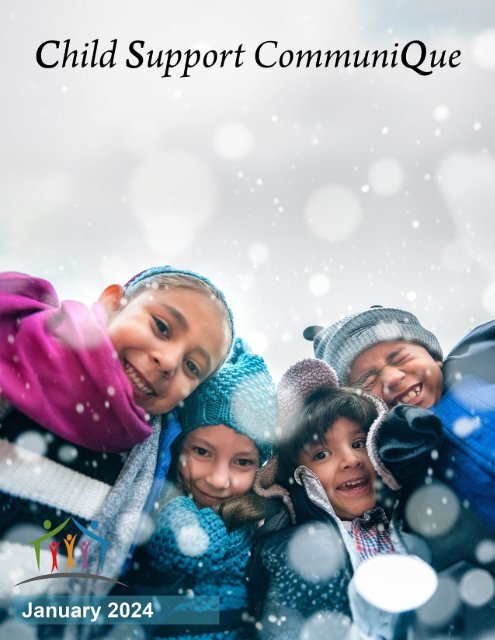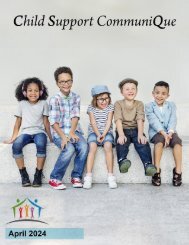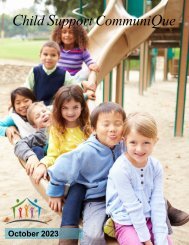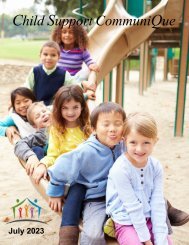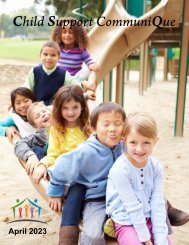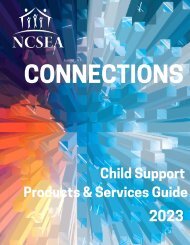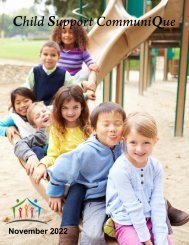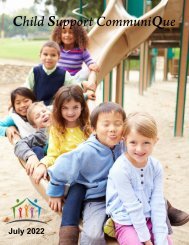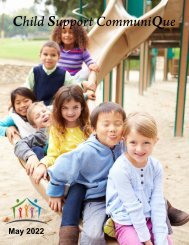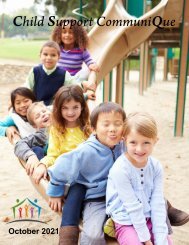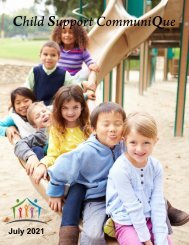January 2024 NCSEA CSQ
Quarterly newsletter containing articles and news of interest for professionals working in the IV-D child support program.
Quarterly newsletter containing articles and news of interest for professionals working in the IV-D child support program.
You also want an ePaper? Increase the reach of your titles
YUMPU automatically turns print PDFs into web optimized ePapers that Google loves.
Table of Contents<br />
<strong>January</strong> <strong>2024</strong><br />
President’s Message ..................................................................... 3<br />
Community Corner: The Profound Impact of Enhanced Domestic<br />
Violence Training and Practices in Arizona ................................... 5<br />
Congress Shines a Light on Federal Tax Information and the Child<br />
Support Program ........................................................................... 8<br />
Behavioral Economics and Attracting Customers to the IV-D<br />
Program ...................................................................................... 20<br />
Texas Succeeds in Extending New Hire Reporting Requirements<br />
to Rideshare Drivers ................................................................... 25<br />
<strong>NCSEA</strong> <strong>2024</strong> Policy Forum Preview ........................................... 31<br />
Breaking the Mold: Exploring Non-Cash Child Support Options for<br />
Parental Empowerment ............................................................... 34
Erin Frisch,<br />
<strong>NCSEA</strong> President<br />
Happy New Year <strong>NCSEA</strong> Members!<br />
I love the practice of reflection and looking ahead that comes at this time of<br />
year. There are so many things going on as we continue exploring the<br />
power of community.<br />
At the last <strong>NCSEA</strong> board meeting in December, we learned about the<br />
National Association for Welfare Research Statistics (NAWRS) and how we<br />
might build a partnership between our two organizations. NAWRS is a<br />
volunteer-run organization that brings together researchers from academic<br />
institutions and research firms, as well as practitioners in the field, to<br />
leverage research and analytics for effective human service programs. I<br />
encourage you to check it out if research is your thing! We’ve also been in<br />
conversation with Casey Family Programs about opportunities to build<br />
stronger connections between child welfare and child support. I’m<br />
encouraged by these efforts to expand our community more broadly in<br />
service of families.<br />
<strong>NCSEA</strong> is fortunate to have strong support from members and our<br />
corporate partners, which affords us the opportunity to give back to the<br />
communities we serve. The Board is working on a policy to make a<br />
financial contribution as well as an investment of time in the locations of our<br />
annual Leadership Symposium. This is a tangible way <strong>NCSEA</strong> as an<br />
organization can support families and children, and I’m excited to see the<br />
impact this will have in the future.
Also at the last Board meeting, we gave final approval for the <strong>NCSEA</strong><br />
Pledge to Diversity, Equity & Inclusion. This statement affirms our<br />
commitment to educating and building a community that values the<br />
experiences of those in our program; centers discussions of equity,<br />
diversity, inclusion, and belonging; and addresses inequities especially<br />
related to race. I’m proud of our organization’s efforts to keep this topic at<br />
the forefront and to dig deep to uproot the seeds of oppression in our<br />
systems.<br />
I also want to share with you an opportunity you will have to provide<br />
feedback to <strong>NCSEA</strong>. We will be issuing a member engagement survey in<br />
<strong>January</strong> to better understand your experiences with <strong>NCSEA</strong> and what we<br />
can do to build a stronger <strong>NCSEA</strong> community. If you get a survey link, I<br />
encourage you to take a few minutes to respond!<br />
Finally, a quick shout-out for the Policy Forum coming in less than a month!<br />
The planning team has outdone itself, and while there will be the usual<br />
thought-provoking and leading policy discussions, we will also have many<br />
new-to-us speakers sharing their expertise and giving us an opportunity to<br />
think about connections with child support. You don’t want to miss it!<br />
Wishing you a year of good things in <strong>2024</strong>,<br />
Erin Frisch<br />
Erin Frisch has served as the Director of the Office of Child Support at the Michigan Department of Health<br />
and Human Services (MDHHS) since 2012. In this role she is responsible for paternity and child support<br />
court order establishment, order modification and enforcement, and locating parents for over 700,000<br />
children and families. She also co-leads the MDHHS Diversity, Equity, and Inclusion Council—a role she<br />
has had since 2019. Erin served from 2019-2020 as Senior Chief Deputy Director for Opportunity at<br />
MDHHS where she oversaw the children’s services agency, the bureau of community services, and the<br />
economic stability administration and focused on integration between public assistance programs and<br />
health, community services, child support and child welfare to reduce poverty for Michiganders. Erin is a<br />
former President of the National Council of Child Support Directors and is the current President of the<br />
National Child Support Engagement Association. Erin graduated from James Madison College at Michigan<br />
State University and has a son and a daughter.
The Profound Impact of Enhanced<br />
Domestic Violence Training and<br />
Practices in Arizona<br />
by Jonell Sullivan, Operations Administrator,<br />
Arizona Department of Economic Security,<br />
Division of Child Support Services<br />
In October 2018, the Arizona Division of Child Support<br />
Services (DCSS) introduced several enhancements to<br />
domestic violence protocol that have made a profound<br />
impact on employees. Through training and system<br />
enhancements, we have bolstered our processes to protect<br />
customer information and refer survivors to organizations<br />
that may help them to safety.<br />
When we first introduced the new protocols, our team was concerned about<br />
adding the responsibility of domestic violence (DV) advocacy in addition to<br />
already large caseloads. To alleviate concerns, we assured our teams that<br />
they are not expected to advocate for domestic violence prevention, but to<br />
recognize, respond, and refer customers who may need domestic violence<br />
supportive services in addition to child support services.<br />
Family Safety Questionnaire<br />
We introduced a family safety screening questionnaire and<br />
trained employees to administer it to every customer orally.<br />
"The family safety questionnaire is a very important first step<br />
to aid customers,” said Child Support Services Officer Bradley<br />
LaCroix. “Sometimes I can sense customers hesitate to<br />
answer; perhaps they are considering certain experiences. Either way, I<br />
tend to err on the side of caution and apply an NDI [non-disclosure<br />
indicator].”<br />
Employees have expanded their knowledge extensively and engaged with<br />
the training, asking clarifying questions, gaining a greater understanding,
and seeking guidance as needed on specific cases. “They use the<br />
questionnaire to recognize potential issues, respond by updating the<br />
system ensuring all safety protocols are in place, and use the resources<br />
that list supportive agencies by location to refer those in need,” said<br />
Training Officer Rosaura Barrett.<br />
Non-Disclosure Indicator (NDI)<br />
If the outcome of the questionnaire indicates any form of<br />
violence, the employee adds the NDI to the case in our case<br />
management system, ATLAS. As part of the enhancements<br />
in 2018, ATLAS was updated to display the NDI more clearly<br />
on customers’ cases. Employees now see several warning<br />
messages alerting them to proceed with caution if the NDI is activated and<br />
family violence may be a concern with one or both parties. The additional<br />
warning screens have been effective, and our teams know how to respond<br />
appropriately.<br />
Domestic Violence Training<br />
The training prepares employees to recognize, respond, and<br />
refer individuals who may be experiencing violence at home.<br />
The DCSS Office of Professional Development partnered with<br />
the Office of Child Support Services and the Arizona Coalition<br />
to End Sexual and Domestic Violence (ACESDV) to develop<br />
training. Representatives from ACESDV participate in classes by answering<br />
trainees’ questions and providing referral resources.<br />
Safe Spaces, Self-Care, and Personal Growth<br />
Our training officers are skilled at creating a safe space. “It’s<br />
rewarding to know I have succeeded at creating the space<br />
necessary for a learner to self-disclose,” explained Rosaura.<br />
“Helping families to safety is deeply fulfilling.”<br />
The classes can be triggering for some employees. “Navigating the feelings<br />
it brought to the surface was difficult at times, but overall the training taught<br />
us how to appropriately handle domestic violence conditions both with<br />
customers and, honestly, outside the workplace as well," said Bradley. At<br />
the end of the classes, DCSS Training Officer Leticia Colbey encourages
the team to practice self-care that evening. She invites them to reflect on<br />
things that bring them joy, such as hugging loved ones.<br />
“The DV education has<br />
changed my perspective of<br />
why it can take so long for<br />
victims to leave and why<br />
they sometimes return to<br />
the place where violence<br />
could happen again.”<br />
– Leticia Colbey<br />
Leticia teaches the domestic violence<br />
classes monthly. “The DV education has<br />
changed my perspective of why it can take<br />
so long for victims to leave and why they<br />
sometimes return to the place where<br />
violence could happen again,” said Leticia.<br />
“I learned that not every DV survivor has<br />
some place they can go, and some have no<br />
one in this world but the DV perpetrator,”<br />
she said. With her new perspective, instead<br />
of advising a survivor to leave, Leticia asks<br />
“What can I do to help?”<br />
“Personally, instructing DV training has improved my understanding…I’m<br />
more knowledgeable about how to engage in conversations with survivors<br />
without being intrusive and provide affirmations, empowerment, respect<br />
and, of course, lots of love,” Rosaura said.<br />
When new employees join DCSS, they take the DV training and gain<br />
access to resources they can use to refer customers to safety as needed.<br />
Jonell Sullivan is the Operations Administrator over Compliance and Financials for the Department of<br />
Economic Security, Division of Child Support Services. Jonell led the team in transforming how Arizona<br />
child support cases are processed when domestic violence is a concern.
Congress Shines a Light on<br />
Federal Tax Information and the<br />
Child Support Program<br />
by Jim Fleming, Tom Joseph, Diane Potts,<br />
Susan Smith, Bryan Tribble, and Vicki Turetsky<br />
On November 29, 2023, the Chairman of the House Ways and Means<br />
Committee convened a joint meeting of the Work and Welfare and<br />
Oversight Subcommittees. The announcement of the hearing listed the<br />
topic as “Strengthening the Child Support Enforcement Program for States<br />
and Tribes” and later described the hearing as pertaining to “Child Support<br />
Enforcement and the Internal Revenue Code.”<br />
Widely believed to be the first Congressional hearing on child support in<br />
more than 20 years, <strong>CSQ</strong> committee member and former <strong>NCSEA</strong><br />
President Diane Potts interviewed four witnesses who testified at the<br />
hearing, as well as <strong>NCSEA</strong>’s advocate Tom Joseph.<br />
Tom, the House has not yet introduced legislation in this area. Is it<br />
common to hold a hearing without a bill to discuss?<br />
The House and Senate hold hearings throughout the year on a<br />
wide range of topics in which there is a federal interest. The<br />
majority party determines what issues will be heard and<br />
identifies most of the witnesses. At times, hearings are political, with the<br />
majority party deciding that an issue, regardless of whether a bill is<br />
introduced, is of interest to the public and may be framed to garner<br />
support for the majority party’s views. Most hearings, however, either set<br />
the stage for future legislation or are conducted to obtain input on a bill<br />
already introduced.<br />
Witnesses are key to the hearing process. Based on their testimony and<br />
the following question and answer period, the committee of jurisdiction<br />
over the issue (here, House Ways and Means) uses the hearing to<br />
determine how a future or existing bill should be written or amended to<br />
achieve the desired policy. Representatives and senators consider the
witnesses to be experts on the subject at hand. Opening statements by<br />
committee members and their questions of witnesses also provide<br />
insight into the support or opposition to the issue among the committee<br />
members.<br />
If the majority party decides that legislation is necessary to address the<br />
issue, it will schedule a time for a markup of the draft bill. Before the<br />
markup, sponsors of the bill often cite supporting testimony from the<br />
legislative hearing, along with comments filed after the hearing, that<br />
helped them draft the bill and support their position. The markup then<br />
proceeds with amendments (‘marks’) to make changes to the underlying<br />
bill. Once approved, the legislation will go to the floor for debate.<br />
Thank you, Tom, for that very helpful background! Now, let’s hear from four<br />
of the witnesses at the hearing: Vicki Turetsky, Jim Fleming, Sue Smith,<br />
and Bryan Tribble. First question: what went through your mind when<br />
you were first asked to testify?<br />
I was honored and hesitant at the same time. I am semi-retired<br />
now and thought I had put all of that behind me. But I<br />
appreciated the opportunity to stand up for the child support<br />
program. During my time in office, I worked extensively with the IRS to<br />
resolve FTI audit issues under section 6103. We also urged that<br />
Congress include direct tribal tax offset authority as part of the 2014<br />
FPLS tribal access legislation proposed by the Obama administration.<br />
I was excited that the tribal parity/contractor issue was getting so<br />
much attention from Congress. I was also glad for the chance to<br />
tell Congress about the tribal consortium that North Dakota<br />
helps, and how that innovative project has been suspended because of<br />
a similar change in the IRS’s position on disclosures.<br />
There were a host of thoughts, mostly centered around whether<br />
this was something of which I was capable, whether I was the<br />
best person to speak regarding something as critical as federal<br />
tax information to so many families served by the states, tribes, and<br />
territories, etc. Then, after I received permission from my leadership and<br />
our Governor’s Office, it became a reality that this was something I was<br />
going to do. So, I began preparing.
I was asked to testify on Monday afternoon, just two days before<br />
the hearing. I felt I was not the expert from my office who should<br />
have been testifying, but I was chosen to stand in for the most<br />
knowledgeable person in our Tribal Offset Partnership program, who<br />
was injured and unable to fly.<br />
Above: Child support witnesses testifying at the Work and Welfare and Oversight<br />
Subcommittees hearing on child support enforcement. Front row (left to right): Vicki Turetsky,<br />
Independent Consultant; Jim Fleming, Child Support Director, State of North Dakota; Bryan<br />
Tribble, IV-D Administrator, State of Illinois; Susan Smith, Director, Lac Courte Oreilles Child<br />
Support Program; and Marley Corbine, mother. Back row (left to right): Tom Joseph, Vice<br />
President and Managing Partner, Paragon Government Relations; Lisa Skenandore, Systems<br />
and Methods, Inc.; and Tish Keahna Kruzan, Lac Courte Oreilles Child Support Program.<br />
Can you describe the speaker selection process that you<br />
experienced?<br />
A group of folks from NTCSA, NCCSD, and <strong>NCSEA</strong> were<br />
included in a string of emails with committee staff following a<br />
virtual meeting on November 14. One of the committee staff<br />
replied to me a few days later asking if I would be available on<br />
November 29 in Washington DC. Since the hearing was still tentative, I<br />
was asked not to tell anyone about the possibility of the hearing. After<br />
that, I had a few emails with committee staff and a call from committee<br />
staff the day before the hearing. At some point, I was advised I was the<br />
majority’s witness, which felt strange since I really hadn’t perceived this<br />
as a partisan issue.
I exchanged a series of emails with staff, then had a meeting to<br />
provide them with my perspective on the issue and explain how<br />
it would impact the families of Illinois. After that, I was told of the<br />
possibility of the hearing. So, I started to work through the approval<br />
process.<br />
As I mentioned, I was a last-minute substitute for another person<br />
from my office.<br />
I was asked to be the witness for the minority Members. I have<br />
worked with the committee staff for 25 years and got a phone<br />
call just before Thanksgiving.<br />
How did you prepare?<br />
I went back through many emails, meeting minutes, etc., that we<br />
have had on this topic over the last year or so. I first reached out<br />
to directors who have been on the front lines of this issue to get<br />
information and direction as to what would resonate. Then, I worked with<br />
our state staff to obtain relative data in an attempt to be able to provide<br />
compelling data and reviewed relevant laws, regulations, and guidance.<br />
I drafted my prepared remarks, compiled a few other possible talking<br />
points, and finally met with my leadership to ensure their goals were met<br />
as well.<br />
I worked with the NTCSA’s Legislative Committee (Tish Keahna,<br />
Lisa Skenandore) to rework the previously prepared testimony to<br />
fit my testifying instead.<br />
I knew Jim, Bryan, and Sue would do a great job laying out the<br />
specifics of the FTI issue. I had a different role in mind for<br />
myself–to help translate child support to the tax world. It was a<br />
joint committee hearing, with many members and their staff having<br />
limited familiarity with the child support program and the important<br />
income support it provides to families. I thought the committee members<br />
might want more context and knew I had only five minutes to give oral<br />
testimony. But I had a method–once I had written my testimony, I<br />
chopped it down to three triple-spaced pages. I tried to distill my written<br />
testimony to make three points: (1) child support is a major income<br />
source for families with limited income; (2) the child support program is
inter-jurisdictional; and (3) the program’s core is secure data<br />
management.<br />
At first, it was just a possibility of a hearing, so I did my best to<br />
get some other stuff done. By the Tuesday before Thanksgiving,<br />
it was pretty clear that the hearing was going to happen, so I<br />
asked myself how I would explain this complicated issue to my own<br />
legislature and started typing. After stealing as much time as I could to<br />
work on my testimony while hosting Thanksgiving, I shared my draft with<br />
folks from NTCSA, <strong>NCSEA</strong>, and NCCSD on Sunday afternoon. They<br />
gave me some great feedback very quickly so I could submit my<br />
testimony by the deadline of 48 hours before the hearing. After hitting<br />
“send” on the written remarks, I started reading my testimony out loud<br />
and removing material until I could get my verbal remarks in under five<br />
minutes. It was a tough editing task, but it prepared me well for the<br />
hearing.<br />
What made you more nervous beforehand–developing and delivering<br />
your prepared remarks? Or the Q&A? Was it easier or more difficult<br />
than you imagined?<br />
I really did not have enough time to prepare. Also, one of the<br />
questions I was asked I had heard before. But when I was asked<br />
the question, it became intertwined with a different question. I<br />
was uncertain what the representative was trying to ask of me, and it<br />
was hard for me to answer.<br />
Before I served as OCSS commissioner, I had a long career as<br />
a national policy advocate. I spent a lot of time on the hill and<br />
had previously worked on legislation with a few of the Committee<br />
Members. I’ve testified about 25 times before Congressional and state<br />
committees. But the last time I testified before a Congressional<br />
committee was more than 13 years ago, and I have turned down most<br />
public speaking requests since leaving OCSS. I am shy, to begin with,<br />
and I was nervous that I was out of practice and that my public speaking<br />
skills were rusty. But once I got started, I was comfortable. Q & A is<br />
always a wild card, but I had tried to prepare for questions ahead of<br />
time.
Preparing the remarks because it is so hard to explain a<br />
complicated issue like this, knowing you have to be brief and<br />
concise in your written testimony and only get five minutes to<br />
testify. Getting down to five minutes was much harder than I imagined.<br />
The Q&A was easier by comparison.<br />
Easily it was delivering the prepared remarks. I started to have a<br />
bit of a panic attack as everything first got underway. Once I<br />
convinced myself that all I had to do was read, I breathed a little<br />
and began to calm down. I think the whole experience was probably<br />
easier than I imagined. When I began speaking, and following the lead<br />
of the other amazing people with whom I was so fortunate to be able to<br />
work that day, it became easier. There may have even been a covert fist<br />
bump under the table, and it really did become kind of fun.<br />
When you look back on that day, what are a few things that stick in<br />
your mind?<br />
I enjoyed reconnecting with hill staff, reuniting with long-time<br />
colleagues, and meeting Marley Corbine, who gave<br />
Congressional Members a clear-eyed view of how withholding<br />
FTI access has harmed tribal families. I especially appreciated Rep.<br />
Gwen Moore’s emphasis on the importance of providing tribal parity for<br />
direct tax offset authority. I also appreciated the bipartisan atmosphere<br />
of the hearing and happily greeted Committee Members, including<br />
Minority Leader Danny Davis and Rep. Moore, both of whom have such<br />
long legislative records of supporting families.<br />
"My career started on Capitol Hill... felt a little like I had<br />
come full circle. As nervous as I was... the warm support<br />
from colleagues before and after the hearing was amazing."<br />
- Jim Fleming<br />
It was a day full of reflection. My career started on Capitol Hill in<br />
August 1989, so it felt a little like I had come full circle. My late<br />
dad and uncle loved politics and probably would have flown out<br />
with me – they were certainly there in spirit. As nervous as I was about
speaking on behalf of the whole child support program at such an<br />
important hearing, the warm support from colleagues before and after the<br />
hearing was amazing. And there may have been an under-the-table fist<br />
bump at one point.<br />
How nervous I was that day is definitely at the top. After that was<br />
the outpouring of well wishes and support I received before the<br />
hearing. Then, there were the congratulatory emails after. I know<br />
we talk about the community and teamwork there is within our small<br />
world of child support, but it is so very true. The level of support I<br />
received and the kindness that was extended, before, during, and<br />
after… all I can say is thank you! It truly meant more to me than any of<br />
you will ever know. On a personal note, I learned that testifying before<br />
Congress was a bucket list item I never knew I had.<br />
What a great job Jim Fleming, Bryan Tribble, Vicki Turetsky, and<br />
Marley Corbine did. I felt there was no congressional<br />
representative who was objecting to fixing the need for Direct<br />
Federal Tax Offset for Tribal Child Support Programs or to the clarifying<br />
of Contractor language for States and Tribes. I felt several of the<br />
Congressional Representatives and their staff who I talked to were<br />
sincere in their efforts going forward to get this done.<br />
Do you think the hearing was effective? What would make it a<br />
successful hearing?<br />
Yes, from the responses and body language of the<br />
subcommittee members, it seemed clear that they were learning<br />
helpful information and saw a problem they wanted to fix. What<br />
would make it a successful hearing? Just the attention to the issue and<br />
having each subcommittee member speak on the record in favor of<br />
strengthening the child support program and fixing the tribal parity and<br />
contractor issues.<br />
I feel that it was very effective. Our role was to succinctly provide<br />
information and details to lawmakers who are in a position to<br />
provide our programs and the families we serve with a remedy<br />
for the current issue that would seriously and negatively impact so<br />
many. What would make it a successful hearing? Ultimately, the
“success” is out of our hands. It will truly be a success when the issue<br />
no longer exists, and no family is being negatively impacted.<br />
Yes, I feel the hearing was effective. It put urgency on the need<br />
for Congress to fix this problem. Success comes when Congress<br />
passes the legislation needed to fix the need for Direct Federal<br />
Tax Offset for Tribal Child Support Programs and to clarify contractor<br />
access for States and Tribes.<br />
I do. Ultimately, the success of a hearing like this is effective<br />
storytelling: Parents and children count on child support, and<br />
they will lose out with narrowed FTI access. Conveying the<br />
human impact of something as dry as section 6103 was as important as<br />
describing the technical issues. I think the hearing was educational,<br />
successfully communicating the importance of child support and the<br />
urgency of continued FTI access for real families. I also think we were<br />
able to convey that the child support program has a strong culture of<br />
information confidentiality and security that holds protection of tax and<br />
other personal data to the highest standards. I think Members came<br />
away from the hearing understanding that narrowed FTI access means<br />
that state and federal costs would skyrocket to maintain the same level<br />
of program effectiveness–and that many states would be unable to<br />
comply.<br />
Would you do it again?<br />
Absolutely!<br />
"This hearing also places a light on the urgency for Congress<br />
to pass a bill... to ensure all Tribal and State Child Support<br />
agencies are able to continue to serve children and families."<br />
- Susan Smith<br />
Yes, most definitely. I feel it was an important step in solving this<br />
issue. This hearing also sheds light on the urgency for Congress<br />
to pass a bill to make the changes necessary to ensure all Tribal
and State Child Support agencies can continue to serve children and<br />
families.<br />
Yes, if I thought it could contribute and add value and bring a<br />
specific perspective, I’d be honored. But I am definitely ready to<br />
pass the baton!<br />
In a heartbeat. I love talking to legislators about child support<br />
and sharing what key partners they can be in strengthening the<br />
program for families. I usually only get to do that with my state<br />
legislature, but if Congress gives us the chance to talk about improving<br />
the program, we should definitely take advantage of that opportunity.<br />
Meet David! The true star of the November 29 Congressional<br />
hearing was David, son of witness Marley Corbine. According<br />
to his mom, David loves playing peek-a-boo, being sung to,<br />
cuddles, and bath time. He is almost rolling over! What a great<br />
example of the millions of children served by the Child<br />
Support program every day.<br />
Thank you all for sharing with us your experience as Congressional<br />
witnesses. One last question–did you have a favorite moment during<br />
the hearing?
It was seeing the awesome young mother, Marley Corbine, with<br />
her baby there to testify before the Congressional Committees.<br />
Well, we all were smitten with Marley’s baby in the audience. I<br />
also loved how Bryan lit up when he described his state’s<br />
innovative policies like 100% family payments. I felt so proud of<br />
the dedication and accomplishments of the three child support directors<br />
on the panel with me–and missed being in the fray.<br />
I like Vicki’s word–we were smitten with Marley’s baby, David. I<br />
could not have imagined ahead of time how impactful it was to<br />
have a young child in the room whose receipt of child support<br />
hinged on whether the committee changed federal law to give tribes<br />
access to FTI. It was very powerful. For the grandparents on the<br />
subcommittees, it probably verged on being irresistible.<br />
I have devoted my entire professional career to serving in the<br />
Illinois child support program. Hearing Illinois referred to as a<br />
“leader” by members of the subcommittee and knowing that my<br />
friends and co-workers would hear this too, made me proud of what we<br />
have been able to accomplish together as a team and what more we will<br />
achieve for the families of our great state.<br />
I would like to close by congratulating all of you on representing the child<br />
support community well on an important issue.<br />
Jim Fleming is the director of the Child Support Section of the North Dakota Department of Health and<br />
Human Services, Immediate Past President of the National Child Support Engagement Association<br />
(<strong>NCSEA</strong>), member of the Board of Directors for the Western Intergovernmental Child Support Engagement<br />
Council (WICSEC), and former President of the National Council of Child Support Directors (NCCSD). Jim<br />
is a member and former co-chair of <strong>NCSEA</strong>’s Policy and Government Relations Committee and NCCSD’s<br />
Policy and Practice Committee, and a member of the NCCSD Executive Committee and the editorial<br />
committee for the <strong>NCSEA</strong> Child Support CommuniQue. Jim also co-chairs NCCSD’s Employer<br />
Collaboration Committee. In 2023, Jim was given a Partnership Award for Professional Excellence from the<br />
National Tribal Child Support Association. Jim was named the 2022 recipient of the American Payroll<br />
Association’s Government Partner Award. He received his B.A. from the University of North Dakota and his<br />
J.D. from Notre Dame Law School.
Tom Joseph has represented public sector clients in Washington, D.C., since the early 1980’s. He has<br />
advocated on behalf of <strong>NCSEA</strong> since 2010. Tom’s career began with the National Association of Counties<br />
(NACo), where he focused on health and human services issues. He later served as NACo’s deputy<br />
director of its legislative department, where he helped manage their lobbying efforts and federal policy<br />
development. Tom left NACo to help establish a Washington, DC, office for Los Angeles County, where he<br />
served full-time as the County’s deputy legislative director. Tom is now Vice President and Managing<br />
Partner at Paragon Government Relations. His firm represents a number of national and state public sector<br />
associations as well as individual county governments. A native Minnesotan and graduate of St. Olaf<br />
College and Duke University, Tom resides in Maryland with his wife Jennifer. As empty nesters, their dog<br />
Phoebe has become their transitional ‘child’ who joins them on their early morning runs.<br />
Diane Potts is the Child Support Lead Director on the National Strategy Team at CGI Technologies and<br />
Solutions Inc. Diane serves on the <strong>NCSEA</strong> Board of Directors and is co-chair of <strong>NCSEA</strong>’s Policy and<br />
Government Relations Committee as well as an <strong>NCSEA</strong> Past-President, past Secretary, and an Honorary<br />
Lifetime Member. Diane also is on the Board of Directors for the Eastern Regional Interstate Child Support<br />
Association (ERICSA) and currently serves as Vice President of Policy and Legislation. In May 2023, she<br />
was awarded ERICSA’s Intergovernmental Award. For six years, Diane was the Illinois Deputy Attorney<br />
General for Child Support. She was appointed as the official observer to the Uniform Law Commission’s<br />
amendment of the Uniform Parentage Act (UPA) on <strong>NCSEA</strong>’s behalf and currently sits on the UPA’s<br />
Enactment Committee. In 2015, she received the Illinois Child Support Lifetime Achievement Award. Diane<br />
received her law degree from Washington University Law School and her undergraduate degree from the<br />
University of Illinois.<br />
Vicki Turetsky is an independent consultant to foundations, nonprofit organizations, and states, and has<br />
authored numerous publications. Between 2009 and 2017, she served as commissioner for the federal<br />
Office of Child Support Services, leading efforts to adopt evidence-based and family-centered policies,<br />
practices, and research that prioritize family well-being, parent engagement, and program equity.<br />
Previously, Ms. Turetsky was the family policy director for the Washington, DC-based Center for Law and<br />
Social Policy (CLASP). She also held positions in the Minnesota Attorney General’s Office, Minnesota<br />
Department of Human Services, MDRC, and Union County Legal Services in New Jersey. She is a former<br />
<strong>NCSEA</strong> board member, actively participated in the policy and conference planning committees, and wrote a<br />
monthly Congressional update column for the Child Support Quarterly for many years. Her work has been<br />
recognized by the Burton Awards (in association with the Library of Congress and American Bar<br />
Association), the National Child Support Engagement Association, the National Tribal Child Support<br />
Association, the Administration for Children and Families, the State of Minnesota, the Annie E. Casey<br />
Foundation, and other organizations. She received her B.A. from the University of Minnesota and her J.D.<br />
from the University of Chicago Law School in 1982.<br />
Susan Smith is currently the Director of the Lac Courte Oreilles Child Support Program. She is a past<br />
President of the National Association of Tribal Child Support Directors and former chair of the IRS-<br />
Legislative Committee. Sue currently serves on the NTCSA Board. She has served on the H.H.S. Assistant<br />
Secretary’s Tribal Advisory Committee. Sue's work history includes Instructor for Professional Development<br />
and Business Ethics at the Lac Courte Oreilles Community College; Lac Courte Oreilles Coordinator for the<br />
Coordinated Services Teams; Oversight of the Lac Courte Oreilles Income Maintenance Program; Director<br />
for the Dallas Early Learning Center; Quality Control Trainer for Hutchinson Technology; Supervisor/Trainer
for Cray Research. Sue has a bachelor's in business administration and is a graduate of Leadership 21<br />
through Cooperative, State, Research, Education and Extension Service (CSREES).<br />
Bryan Tribble, with over two decades of dedicated service in various capacities within the Illinois<br />
Department of Healthcare and Family Services–Division of Child Support Services (CSS), boasts a rich<br />
background in policy development, administration, and leadership. His journey as an accountant<br />
commenced in 2001, evolving swiftly to spearhead pivotal projects like the Professional and Recreational<br />
License Revocation and the Administrative Driver’s License Suspension. Passionate about merging child<br />
support expertise with research and implementation, Bryan transitioned to managerial roles in policy,<br />
eventually assuming the helm as the IV-D Administrator for the State of Illinois in 2021. Throughout his<br />
tenure, Bryan actively contributed to the Illinois Family Support Enforcement Association (IFSEA), holding<br />
multiple leadership positions and continuing his involvement as an appointed director. Nationally, he<br />
participated in various capacities within the National Child Support Engagement Association (<strong>NCSEA</strong>),<br />
including committee roles focused on policy, government relations, and emerging issues. Bryan remains a<br />
committed member of the NCCSD Policy and Practice Committee, showcasing an enduring commitment to<br />
advancing child support policies and practices.
Behavioral Economics and Attracting<br />
Customers to the IV-D Program<br />
by Taylor Ashe, Policy Program Consultant - Program Initiatives,<br />
Virginia Division of Child Support Enforcement<br />
In the book Nudge: The Final Edition, Nobel Prize in<br />
Economics winner Richard Thaler and author Cass<br />
Sunstein present a comprehensive introduction to<br />
behavioral economics for the individual,<br />
governments, and society as a whole. i Building off the<br />
comprehensive research on human decision-making<br />
pioneered by Daniel Kahneman, this book highlights<br />
how child support professionals can think of<br />
themselves as “choice architects” who are<br />
“responsible for organizing the context in which<br />
people make decisions” every time they build or<br />
engage in an interaction with parents. ii<br />
At the core of behavioral economics is the discovery that humans make<br />
decisions with countless biases at play. These biases are always present<br />
and inform the way we navigate websites, read email, or process and<br />
internalize advertising. Like the architects who design the built world, child<br />
support professionals have a range of tools available when designing<br />
interactions with potential customers that can help integrate biased human<br />
decision-making into an informed, easy, and pleasant choice architecture
experience. Some of the more powerful tools noted in Nudge and in much<br />
other behavioral economic research are described below:<br />
• Default options are powerful. In countless experiments, defaults<br />
have been found to be highly effective. iii The Texas Office of the<br />
Attorney General received a waiver from the federal Office of Child<br />
Support Services (OCSS) in 1996 that allowed the Texas Child<br />
Support Division to bypass the requirement that families must apply<br />
for IV-D services and pay a fee unless the child is receiving certain<br />
federally-funded benefits. With this waiver, Texas enacted a program<br />
that automatically enrolled all new child support orders in divorce<br />
cases into the IV-D program in counties that chose to participate.<br />
These families could opt out if they chose to, but the default option<br />
was automatic enrollment. An evaluation of this program showed it<br />
was effective; it increased the IV-D caseload and improved<br />
collections. iv After allowing this program to operate for many years,<br />
OCSS eventually terminated the waiver in 2021. Since then, the<br />
Texas Division of Child Support has implemented a streamlined<br />
application process for parties in divorce cases who want to opt into<br />
IV-D services in those counties that participated in the waiver.<br />
• Humans are social creatures. There are countless ways in which<br />
the actions of others who share aspects of identity (political affiliation,<br />
parenthood status, job, etc.) have a profound effect on the decisions<br />
humans make. Language such as, “Parents who work full-time like<br />
you…” can be powerful ways to increase customer engagement.<br />
• Give feedback during a decision-making event. Indicators such as<br />
a progress bar showing how much is left on an online application or<br />
green checkmarks next to the correct format for email addresses and<br />
phone numbers provide real-time feedback to customers and<br />
encourage their decision to continue.<br />
• Describe the result of a choice as a real-world outcome. For<br />
example: “By checking this box, a Family Violence Indicator (FVI) will<br />
be placed on your account for you and your dependents. This will<br />
ensure that none of your personal identifiable information including<br />
address or phone number are shared with the other parent.”
While these are powerful tools that can be used to improve a potential<br />
customer’s experience, considerable thought should be given to the ethical<br />
dimensions surrounding choice architecture. Thaler and Sunstein note that<br />
the purpose of their exploration of “nudges” is to encourage “efforts…to<br />
steer people’s choices in directions that improve their lives.” v In all choice<br />
architecture and interaction design, this purpose should always remain at<br />
the center.<br />
Great Customer Service is at the Heart of the Connection<br />
“Great customer service<br />
means adapting to the<br />
needs of the current<br />
population…effective<br />
digital marketing can be a<br />
key resource in expanding<br />
knowledge about the child<br />
support system”<br />
Ensuring agencies are focused on<br />
providing great customer service is at the<br />
heart of connecting to current customers<br />
and drawing in new ones. In <strong>January</strong> 2023,<br />
the Urban Institute (UI) released a brief<br />
entitled “Improvements in Public Programs’<br />
Customer Service Experiences Could<br />
Better Meet Enrollees’ Needs and Help<br />
Build Trust in Government.” The brief<br />
centered on follow-up research from the<br />
December 2021 Urban Institute Well-Being and Basic Needs Survey, and<br />
interviewed 27 nonelderly adults who had applied for or received TANF<br />
cash assistance at that time and reported an enrollment challenge. While<br />
focused specifically on TANF and Medicaid/CHIP enrollees, the brief<br />
provides broad lessons that can be applied to customer service<br />
experiences across all government service programs, including child<br />
support.<br />
First, educating this specific demographic of their eligibility and the benefits<br />
of the child support program is important. UI researchers highlighted that<br />
potential customers learn about programs and eligibility requirements<br />
through various sources, including other public programs or fellow<br />
applicants, with most applying on their own. In addition, a study by the Pew<br />
Research Center in late 2018 showed that 81% of Americans “rely a lot on<br />
their own research,” and that Google was the single most commonlynamed<br />
digital tool vi . Digital marketing complements the idea of meeting<br />
customers where they are. Great customer service means adapting to the<br />
needs of the current population, so effective digital marketing can be a key
esource in expanding knowledge about the child support system to those<br />
who are unaware of the services they could receive.<br />
UI researchers identified four common challenges applying for, enrolling in,<br />
and renewing Medicaid/CHIP or TANF:<br />
• Difficulty finding information about how to complete the application;<br />
• Unclear documentation requirements;<br />
• Long waiting periods and tight timelines to submit documentation;<br />
and<br />
• Frustrating renewal process.<br />
Ultimately, these challenges triggered delays in getting assistance and had<br />
“negative consequences on [customers’] lives”. vii Utilizing behavioral<br />
economics to make it easy for potential customers is directly in line with the<br />
first three of the researchers’ primary suggestions for improving customer<br />
service: reduce paperwork requirements; increase automatic<br />
enrollment/joint applications between programs; and improve state agency<br />
websites and online application systems. viii Great customer service means<br />
clearing unnecessary blockages in the application process and streamlining<br />
the customer’s experience to include as few pages, or clicks, as possible.<br />
While all of these suggestions may not be applicable in every scenario,<br />
respecting the busy lives that customers lead reiterates the child support<br />
program’s commitment to customers’ value and participation.<br />
The last and perhaps the most powerful findings from UI indicate the<br />
impact of being nice. Respondents explained to researchers that applying<br />
for public programs can feel “overwhelming” and “stressful,” in addition to<br />
feeling stigmatizing. ix In this vulnerable state, customers were especially<br />
sensitive to the perceived judgments of staff and caseworkers. This aligns<br />
with findings that have emerged from behavioral research highlighting the<br />
long shadow cast over decision-making by the experience and memory of<br />
first impressions, known as the “primary effect.” x These findings also<br />
parallel the digital marketing grants’ results indicating that “judgment-free”<br />
marketing campaigns connected more effectively with potential customers.<br />
This research implores child support leaders to take to heart the Urban<br />
Institute’s suggestions to improve customer service by “hiring and training<br />
staff to be empathetic, nonjudgmental, and committed to resolving<br />
applicants’ questions and issues” xi to ensure the emotional needs of our
customers are not forgotten. Potential customers will remember how they<br />
felt on that first phone call, or the language on their first online application,<br />
and it’s imperative that child support professionals put their most<br />
compassionate foot forward from the beginning.<br />
Conclusion & Practical Tips for Attracting Customers to the IV-D<br />
Program<br />
Behavioral economics suggest that child support agencies<br />
can attract potential customers by making it easy for them to<br />
apply and giving them great customer service. Even with all<br />
the digital ways to communicate with current customers and<br />
potential customers, many still prefer traditional ways of<br />
communicating, such as phone calls and face-to-face<br />
appointments. The best way to engage potential customers is to<br />
communicate with them in their preferred way and to continuously improve<br />
the ways the child support program offers services, promotes programs,<br />
and communicates with customers. In addition to targeting a specific<br />
audience, to achieve the best results agencies must keep in mind that<br />
marketing messages should reflect the social and economic context in<br />
which potentially eligible clients live.<br />
i<br />
Richard H. Thaler and Cass R. Sunstein, (2021) Nudge: The Final Edition<br />
ii<br />
Thaler and Sunstein, 3<br />
iii<br />
Ibid., 11<br />
iv<br />
Daniel Schroeder and Ashweeta Patnaik (2016) Texas Integrated Child Support System: Final Evaluation Report Ray Marshall Center,<br />
University of Texas at Austin.<br />
https://sites.utexas.edu/raymarshallcenter/files/2016/10/ICSS_Local-Rule_Final_Sep2016.pdf<br />
v<br />
Thaler and Sunstein, 3<br />
vi<br />
https://www.pewresearch.org/short-reads/2020/03/05/most-americans-rely-on-their-own-research-to-make-big-decisions-and-that-oftenmeans-online-searches/<br />
vii<br />
https://www.urban.org/research/publication/improvements-public-programs-customer-service-experiences, 3<br />
viii<br />
Ibid.<br />
ix<br />
Ibid., 13<br />
x<br />
APA Dictionary of Psychology, Primacy Effect https://dictionary.apa.org/primacy-effects<br />
xi<br />
https://www.urban.org/research/publication/improvements-public-programs-customer-service-experiences, 3<br />
Taylor Ashe is a Policy Program Consultant for the Program Initiatives team with the Virginia Division of<br />
Child Support Enforcement. He started with the agency in February of 2021 and currently serves as the<br />
Project Manager for Virginia’s Safe Access for Victims’ Economic Security (SAVES) demonstration grant.<br />
Taylor’s interests in research design, data analysis, and critical theory keep him busy reading about,<br />
designing, and implementing human-centered services that reflect the needs of the citizens he serves.<br />
Taylor has a master’s degree in public administration from the University of Georgia.
Texas Succeeds in Extending New Hire<br />
Reporting Requirements to Rideshare Drivers<br />
by Joel Rogers, Associate Deputy Attorney General for Child<br />
Support Legal Services, Texas Office of the Attorney General<br />
In 2021, the Texas Legislature passed House Bill (HB) 458, which<br />
specifically clarified that rideshare companies operating in Texas must<br />
comply with the state’s new hire reporting requirements for their<br />
independent contractor drivers. Upon enactment by the Governor, this<br />
legislation, combined with collaboration among the Texas Title IV-D agency,<br />
the Office of the Attorney General – Child Support Division (OAG-CSD),<br />
and one major rideshare company, has generated millions of dollars in new<br />
child support collections through income withholding for Texas families.<br />
As a bit of background, Texas law has historically defined compensation<br />
paid to independent contractors as “earnings” and specified that “earnings”<br />
are the basis of guideline child support calculations and are subject to<br />
income withholding for child support. However, the term “earnings” was not<br />
used in the state’s statutes related to new hire reporting requirements,<br />
which just referred to traditional employment terms like “employer” and<br />
“employee.”<br />
In 2015, the Texas Legislature attempted to address this issue by<br />
expanding the definition of “employee” in the new hire reporting laws to<br />
include “individuals hired as independent contractors.” However, other<br />
language in the state’s new hire reporting statutes still utilized terms like<br />
“employer,” “newly hired,” and “rehired,” which still seemed to apply
primarily to traditional W-2 employees and<br />
not to independent contractors earning<br />
compensation through the gig economy,<br />
such as rideshare or delivery drivers.<br />
As a result, this initial legislative change did<br />
not significantly increase new hire reporting<br />
by companies utilizing independent<br />
contractors. Specifically, this approach did<br />
not seem effective in compelling rideshare<br />
companies to utilize new hire reporting for<br />
their independent contractor drivers. For<br />
“The Texas child support<br />
program strives to be a<br />
leader in engaging with<br />
companies and individuals<br />
who operate in the gig<br />
economy to ensure that they<br />
comply with child support<br />
laws and that support<br />
obligations get paid.”<br />
example, in the six-month period before the legislative change, the OAG-<br />
CSD received only 27 new hire reports from one of the major national<br />
rideshare companies, all related to their full-time equivalent employees.<br />
When HB 458 was filed by Representative Matt Shaheen in 2021, its stated<br />
purpose was to remedy a concern that Texas’ statutes related to income<br />
withholding and new hire reporting did not adequately address child<br />
support collections for those working for “transportation network<br />
companies” or “certain technology platforms used for deliveries.” A<br />
rideshare company was termed a “transportation network company” under<br />
existing Texas law, defined as an “entity that for compensation, enables a<br />
passenger to prearrange with a driver, exclusively through the entity’s<br />
digital network, a digitally prearranged ride.”
HB 458 addressed this issue by ensuring that the new hire reporting<br />
requirements for Texas employers also applied to rideshare and similar<br />
type delivery companies that employ large numbers of gig economy<br />
workers. It did this by simply clarifying the definition of four statutory terms<br />
that applied to the state’s new hire reporting program:<br />
• “Earnings” was defined to include compensation from a<br />
transportation network company and compensation from a person<br />
that operates a technology platform used to make deliveries to<br />
customers;<br />
• “Employee” was defined to include a driver who logs in to the digital<br />
network of a transportation network company, regardless of whether<br />
the driver is considered an independent contractor, and an individual<br />
who logs in to or otherwise uses a technology platform to make<br />
deliveries for compensation;<br />
• “Employer” was defined to include a transportation network<br />
company and a person who operates a technology platform used to<br />
make deliveries to customers; and<br />
• “Newly Hired Employee” was defined to include individuals who<br />
receive “earnings” from the employer and who might not strictly be<br />
employed, hired, or rehired in the traditional sense.<br />
Clarifying that rideshare and<br />
similar type companies were<br />
required under state law to<br />
report their independent<br />
contractor drivers to the OAG-<br />
CSD’s State Directory of New<br />
Hires would then help facilitate<br />
the issuance of automated<br />
income withholding orders<br />
(IWOs) to the companies to<br />
withhold any court-ordered<br />
child support obligations from compensation paid to their drivers.<br />
Upon enactment of the new law, but prior to its effective date of September<br />
1, 2021, one major rideshare company, Lyft, immediately reached out to the<br />
OAG-CSD to seek guidance to ensure that their company could be in
compliance with the clarified new hire reporting requirements that now<br />
clearly applied to their 1099 independent contractor drivers. The OAG-<br />
CSD’s Employment Services team began meeting with Lyft weekly to work<br />
out logistical issues related to new hire reporting and income withholding<br />
for their drivers. These weekly meetings continued for six months, well past<br />
the law’s effective date.<br />
Some of the issues addressed during the OAG-CSD’s collaboration with<br />
Lyft were:<br />
• Data/file transfer protocols for the state’s employer portal;<br />
• Changes to the portal to create a new identification code for<br />
independent contractors; and<br />
• Instruction on how to properly respond electronically to National<br />
Medical Support Notices that might now be generated to Lyft for<br />
some of their drivers by the state’s automated child support system.<br />
Lyft also made internal processing changes to<br />
reroute IWOs for their drivers from their Payroll<br />
Department to their Accounts Payable<br />
Department since that department pays the<br />
drivers. The OAG-CSD then worked with Lyft’s<br />
Accounts Payable team, which lacked experience processing IWOs, by<br />
providing instruction on properly calculating withholding amounts from<br />
drivers’ periodic earnings, which optionally can be paid to some drivers as<br />
often as daily, including addressing the maximum withholding limits.<br />
Once the law took effect, the impact of both the legislative change and the<br />
OAG-CSD’s collaboration with Lyft was readily apparent. Comparing<br />
numbers for state fiscal year (SFY) 2022 (the year following the effective<br />
date of the legislative change) to the prior year, in SFY 2021:<br />
• IWOs to Lyft increased from 119 per year to almost 10,000 per year<br />
(the monthly average increased from 10 to 828);<br />
• Total yearly collections from Lyft increased from $227,000 to almost<br />
$9.2 million (averaging over $765,000 per month); and<br />
• Total cases paying from Lyft increased from an average of 37 per<br />
month to almost 1,500 per month.
The ongoing successful impact of this legislation is also apparent in data<br />
compiled from the most recently completed state fiscal year. In SFY 2023,<br />
the OAG-CSD issued 7,428 income withholding orders for Lyft independent<br />
contractors and collected over $7.5 million in child support for Texas<br />
families.<br />
The table below compares SFY 2021 results to SFY 2023 results,<br />
illustrating the success the OAG-CSD has realized working with Lyft.<br />
$900,000<br />
$800,000<br />
$700,000<br />
Lyft Income Withholding Child Support<br />
Collections<br />
FY21/FY23 Comparison<br />
Collections<br />
$600,000<br />
$500,000<br />
$400,000<br />
$300,000<br />
$200,000<br />
$100,000<br />
$0<br />
Sept Oct Nov Dec Jan Feb Mar Apr May June July August<br />
Month<br />
FY21<br />
FY23<br />
The Texas child support program strives to be a leader in engaging with<br />
companies and individuals who operate in the gig economy to ensure that<br />
they comply with child support laws and that support obligations get paid. In<br />
the upcoming months, the OAG-CSD will work with other major companies<br />
in Texas that utilize rideshare or delivery drivers as independent contractors<br />
to improve compliance with the state’s new hire reporting requirements and<br />
increase the amount of support collected and distributed to families through<br />
IWOs. Fortunately, following its collaboration with the OAG-CSD, Lyft<br />
agreed to become a member of the agency’s Employer Task Force,
enabling them to be utilized as both a resource and an example when<br />
approaching other rideshare or delivery companies.<br />
Joel Rogers is the Associate Deputy Attorney General for Child Support Legal Services for the Texas<br />
Office of the Attorney General. In that role, he supervises over 300 Assistant Attorneys General and<br />
oversees all areas of legal practice for the Child Support Division. Mr. Rogers joined the Child Support<br />
Division in 1995 and has worked in several areas of the agency, serving in various senior management<br />
roles. Since 2011, Mr. Rogers has also served in a dual capacity as the Child Support Division’s legislative<br />
attorney, representing the Title IV-D agency at the State Capitol and in legislative hearings. Mr. Rogers<br />
graduated with a B.A. from the University of Texas at Austin in 1989 and received his J.D. from George<br />
Washington University Law School in 1992.
<strong>NCSEA</strong> <strong>2024</strong> Policy Forum Preview<br />
by Laura Galindo and Trish Skophammer,<br />
<strong>NCSEA</strong> <strong>2024</strong> Policy Forum Co-chairs<br />
We are excited to share a sneak peek into Policy Forum <strong>2024</strong>! This year’s<br />
theme is “Building Community, Centering Families, Advancing<br />
Equity,” and we’re offering some great plenaries that address working with<br />
the community, including the voices of those we serve and those with<br />
whom we partner, and understanding the impact on families when child<br />
support and other systems intersect.<br />
Child support and human services professionals from around the country<br />
will gather February 1-3 in Washington, D.C. for the annual Policy Forum.<br />
<strong>NCSEA</strong> continues to provide rich content, dynamic speakers, and an<br />
opportunity to network. We continue to move the child support program<br />
forward through listening and learning from one another.<br />
We set out to plan a conference that includes many voices, especially<br />
those we don’t hear from often enough. We also wanted to dig into how<br />
families are impacted when they are involved in multiple programs, and<br />
how we can do more to collaborate so that families thrive.<br />
On Thursday, we will hear from the federal Office of Child Support Services<br />
(OCSS) Commissioner, Tanguler Gray, about how OCSS has collaborated<br />
with other programs. Commissioner Gray will share achievements and<br />
lessons learned along the way. We will also hear about recent OCSS<br />
initiatives to support tribal child support programs and some preliminary<br />
information about the Advancing Equity in Child Support grant. Also on
Thursday, <strong>NCSEA</strong> President Erin Frisch will lead a discussion on the future<br />
of child support with staff from the Senate Committee on Finance and the<br />
House Committee on Ways and Means. We will learn about hot topics on<br />
the Hill and the initiatives and priorities that Congress is considering.<br />
“This conversation will help<br />
drive meaningful change to<br />
improve the lives of children<br />
and families.”<br />
The Thursday afternoon line-up includes a<br />
plenary on generative artificial intelligence<br />
(AI). AI has been front and center in the<br />
news recently, but what does it mean for<br />
government agencies, what questions and<br />
concerns are being discussed, and more<br />
importantly, how can this technology help to better serve child support<br />
clients/customers? Also on Thursday, we’ll learn about engaging the<br />
community, leveraging strengths and perspectives, and the grassroots<br />
connections that community-based organizations have with the people we<br />
serve. This conversation will help drive meaningful change to improve the<br />
lives of children and families.<br />
Friday morning starts with a conversation with the<br />
authors of The Injustice of Place: Uncovering the<br />
Legacy of Poverty in America. This session will give<br />
us a closer look at poverty in rural America,<br />
including the challenges these communities face<br />
and how the exploitation of resources has impacted<br />
them. Friday morning also includes a plenary on<br />
new and innovative approaches to employment<br />
services. We will learn how programs are taking a family-centered<br />
approach to employment services, and how our federal partners are<br />
supporting this approach.<br />
On Friday afternoon, we are excited to present<br />
Heather McGhee, author of The Sum of Us: What<br />
Racism Costs and How We Can Prosper Together.<br />
Heather’s presentation will be followed by a<br />
discussion-led session with President Frisch and<br />
Commissioner Gray. This is an exciting opportunity<br />
to learn how policies driven by structural racism
impact not just people of color but include real-life costs to everyone.<br />
Saturday morning opens with a plenary on<br />
tribal child support. Panelists include those<br />
with a deep understanding of the unique<br />
challenges and opportunities within tribal<br />
communities. We will learn why improving<br />
tribal child support involves collaboration<br />
and cultural sensitivity. The second<br />
“We will learn why<br />
improving tribal child<br />
support involves<br />
collaboration and cultural<br />
sensitivity.”<br />
session on Saturday, and the final session of the Policy Forum, will explore<br />
how policy development processes must evolve to gain a better<br />
understanding of the direct impact on families. We will learn best practices<br />
for including parents, guardians, and advocates to avoid unintended<br />
consequences.<br />
We look forward to seeing you in Washington, D.C. for the <strong>2024</strong> Policy<br />
Forum, where we will continue to learn, think about, and discuss policies<br />
and issues that influence the child support program. We hope you will join<br />
us on the continued journey to a world where every child receives reliable<br />
financial and emotional support.<br />
Laura Galindo is a Senior Consultant with CSG Government Solutions in the Child Support Practice. Prior<br />
to joining CSG Government Solutions in 2018, Laura served as the IV-D Director from December 2015<br />
through April 2018. She was tapped as the IV-D Director while serving as the Deputy IV-A Director over<br />
field operations. Laura worked for the State of New Mexico for over 29 years. Laura has been active in a<br />
wide range of <strong>NCSEA</strong> committees such as Legislative Education, CommuiQue (<strong>CSQ</strong>), Emerging Issues &<br />
Best Practices, Research, Audit, Nominating, Professional Development, Web-Talks, Leadership<br />
Symposium, and Policy Forum, and is currently on the Board of Directors.<br />
Dr. Trish Skophammer serves as the Child Support Services Division Director in the Ramsey County<br />
Attorney’s Office in St. Paul, Minnesota. She has 26 years of experience in child support. She has been<br />
involved in <strong>NCSEA</strong> for many years, co-chairing the Web-Talks committee, serving on the Leadership<br />
Symposium and Policy Forum planning committees, the Emerging Issues and Leading Practices<br />
subcommittee, and on the <strong>NCSEA</strong> Board as former Director. She actively participates in local associations<br />
and committees, delivering talks on diverse subjects at national, regional, and local events. In addition to<br />
her expertise in child support policy and practice, Trish’s expertise includes leadership topics such as<br />
performance management, strategic planning, and diversity, equity, and inclusion. Trish has a master’s<br />
degree in organizational leadership from Bethel University and a doctorate in public administration from<br />
Hamline University.
Breaking the Mold: Exploring Non-Cash Child<br />
Support Options for Parental Empowerment<br />
by Karen Roye, Director, San Francisco Department of<br />
Child Support Services<br />
The welfare and well-being of children should always be a top priority in<br />
any separation or divorce. When parents part ways, it becomes crucial to<br />
establish a child support arrangement that ensures the child's needs are<br />
met. Traditionally, child support payments have been made in cash, but<br />
what if there were another way? What if parents had the freedom to choose<br />
how they contribute to their child's well-being?<br />
In recent years, a groundbreaking approach has emerged: non-cash child<br />
support court orders. This innovative concept allows parents to move away<br />
from traditional cash payments and instead consider alternative ways to<br />
provide for their children.<br />
With this knowledge in mind, the San Francisco Department of Child<br />
Support Services (SF DCSS) initiated an in-kind pilot program. This article<br />
details the motivations that prompted SF DCSS to pursue non-cash child<br />
support court orders. In 2023, The Urban Institute (UI) worked with SF<br />
DCSS to examine the department's pilot program, culminating in an indepth<br />
analysis published in July 2023.<br />
Access more detailed information concerning the pilot, including the entire<br />
text from the UI brief and a two-page fact sheet, by clicking the proceeding<br />
[linked] assets.
BRIEF<br />
FACT SHEET<br />
Understanding Non-Cash Child Support Court Orders<br />
Before delving into the benefits and intricacies of non-cash child support<br />
court orders, it's essential to understand the limitations of traditional cash<br />
payments. While cash has been the go-to method, it may not always align<br />
with the child's needs. Cash payments can be restrictive and may not<br />
directly contribute to the child's well-being. This is where non-cash child<br />
support options step in.<br />
Non-cash child support court orders offer parents the freedom to explore<br />
various support methods tailored to their child's needs. Instead of relying<br />
solely on cash, parents can consider alternative arrangements that directly<br />
benefit their child. This innovative approach empowers parents to think<br />
outside the box and choose support methods that align with their situation<br />
and their child's individual requirements.<br />
The Benefits of Non-Cash Child Support Court Orders<br />
One of the primary advantages of non-cash child support court orders is<br />
the freedom and flexibility they provide. Through these arrangements,<br />
parents can think creatively and find ways to support their children beyond
simple cash payments. They can contribute in meaningful ways that directly<br />
impact their child's growth and development.<br />
A non-cash support arrangement opens doors to various possibilities. For<br />
instance, instead of paying cash, parents could choose to cover specific<br />
expenses directly, such as medical bills, education fees, or extracurricular<br />
activities. Taking care of these specific needs not only ensures the child's<br />
well-being, but also fosters a sense of parental involvement and<br />
responsibility.<br />
Additionally, non-cash child support court orders emphasize parental<br />
involvement in decision-making. Allowing parents to choose how they<br />
support their child recognizes their unique perspective and the intimate<br />
knowledge they have of their child's needs. This involvement builds a<br />
sense of empowerment and collaboration, crucial elements for successful<br />
co-parenting.<br />
Parental Choice: Tailoring Support to the Child's Needs<br />
“Parental choice is a<br />
fundamental aspect of noncash<br />
child support<br />
arrangements. It allows<br />
parents to consider the<br />
specific needs of their child<br />
and choose how they<br />
contribute.”<br />
Every child is unique, with diverse needs<br />
and interests. Recognizing this diversity,<br />
non-cash child support court orders provide<br />
a platform for parents to tailor support<br />
methods that cater specifically to their<br />
child's requirements.<br />
Parental choice is a fundamental aspect of<br />
non-cash child support arrangements. It<br />
allows parents to consider the specific needs of their child and choose how<br />
they contribute. For example, a child with a passion for music might benefit<br />
more from support that covers music lessons and instrument expenses<br />
instead of a simple cash payment.<br />
Furthermore, non-cash support arrangements encourage parents to think<br />
critically about how they can best support their child's well-being. It<br />
encourages communication and collaboration between parents, fostering<br />
an environment of shared decision-making that benefits the child.<br />
The Five-Stage Process Leading to a Non-Cash Child Support Court<br />
Order
Creating a non-cash child support court order involves a five-stage process<br />
that aims to gather information and ensure that the proposed support<br />
arrangement aligns with the child's best interests.<br />
Stage 1: Informing the parents about non-cash support options. In this<br />
initial stage, the concept of non-cash child support court orders is<br />
introduced to the parents. They learn about the benefits and possible<br />
alternatives to cash payments.<br />
Stage 2: Facilitating discussions between the parents. With an<br />
understanding of non-cash support options, the parents engage in<br />
facilitated discussions. These discussions allow them to express their<br />
preferences, concerns, and explore various non-cash support<br />
arrangements.<br />
Stage 3: Mediation and negotiation to reach an agreement. Mediators play<br />
a vital role in this stage, helping parents find common ground and negotiate<br />
a non-cash support arrangement that works for both parties. The child's<br />
best interests are always at the forefront of these discussions.<br />
Stage 4: Assessing the proposed non-cash support arrangement. The<br />
proposed non-cash support arrangement is carefully evaluated to ensure it<br />
fulfills the child's needs. This assessment helps guarantee that the support<br />
provided will genuinely benefit the child.<br />
Stage 5: Final determination and modification of the child support order.<br />
The court makes the final determination based on the information provided<br />
by the parents, the facilitators, and the mediators. The child support order<br />
is then modified to incorporate the agreed-upon, non-cash support<br />
arrangements, providing a legally recognized framework.
Conclusion<br />
Non-cash child support court orders represent a significant shift in how<br />
parents contribute to their child's well-being during and after divorce or<br />
separation. By allowing parents to move beyond cash payments and<br />
consider alternative support arrangements, children benefit from more<br />
tailored and meaningful support. This empowered parenting approach<br />
encourages collaboration, parental involvement, and ultimately prioritizes<br />
the best interests of the child. As we embrace non-cash child support<br />
options, we are breaking the mold and paving the way for more<br />
empowering and effective methods of child support.<br />
The Team<br />
San Francisco Local Child Support Agency<br />
• Karen Roye, Director<br />
• Carol Beckett, Assistant Director<br />
• Lisa Saporito, Managing Attorney<br />
• Freda Randolph Glenn, Operations<br />
Manager<br />
• Sheryl Myers, Operations Manager<br />
San Francisco Unified Family Court<br />
• Hon. Rebecca Wightman, Commissioner<br />
Office of the Family Law Facilitator<br />
• Judy B. Louie, Director<br />
• Adriane Majlesi, Attorney<br />
• Miguel Rivera, Attorney<br />
• Eric Aguirre, Attorney<br />
Family Court Services<br />
• Felicia Fleming, Acting Manager<br />
• Venecia Margarita, Family Court<br />
Mediator<br />
Special Advisors<br />
• Hon. Abby Abinanti,<br />
• Chief Judge of the Yurok Tribe<br />
• Jennifer Burgess, Program<br />
Manager Title IV-D (Director)<br />
Karen M. Roye was appointed Director of the San Francisco Department of Child Support Services by<br />
Mayor Gavin Newsom in 2004. Director Roye has been a pioneer in introducing innovative programs and<br />
collaborations that revolutionized child support service delivery to custodial and non-custodial parents in<br />
San Francisco. Today, SF DCSS provides a variety of service models that support parents such as: C-<br />
NET, Enhanced Transitional Jobs Demonstration Project (Transitions SF), County Jail Outreach, Debt<br />
Relief, and enhanced domestic violence case management. SF DCSS has developed a parental<br />
empowerment portfolio of innovative services that includes early intervention strategies, family violence<br />
prevention, referrals to employment services, and active collaborations with local partners. Director Roye’s<br />
goal is to create service delivery models that keep pace with the needs of families today so that children<br />
can continue to count on their parents for the financial and medical support they need to be healthy and<br />
successful.


